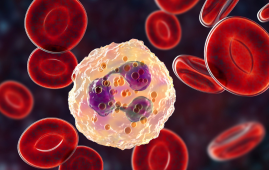

The outcomes of an international Phase III clinical trial conducted by researchers from the University of Pennsylvania Perelman School of Medicine and a multicenter group of investigators, published today in the New England Journal of Medicine, show that adults with hemophilia B experienced an average 71% reduction in the number of bleeding episodes following a single infusion of gene therapy.
About 30,000 people in the US, usually men, have hemophilia, a genetic condition that prevents blood from clotting. If untreated, it may result in spontaneous bleeding, especially internal bleeding into the joints, which over time may cause excruciating joint damage and decreased range of motion. Lack of clotting factor IX results in hemophilia B. By allowing the liver to produce factor IX, gene therapy shields patients against recurrent bleeding and permits blood clotting.
“What we saw from patients in this study was that within a few days of receiving the gene therapy infusion, it took root, and their bodies started making factor IX for the first time in their lives,” said study investigator and lead author Adam Cuker, MD, MS, section chief for Hematology, and clinical director of the Penn Blood Disorders Center and the Penn Comprehensive Hemophilia Program. “We always want to be careful about using the word ‘cure’ especially until we have longer follow-up data, but for many of these patients, it’s been life changing.”
Following the gene therapy, the trial participants experienced a 71 percent drop in their average bleeding rate after at least a year of follow-up. The previous year, they were treated with preventive infusions of factor IX, which is the conventional treatment for the disease. After undergoing gene therapy, more than half of the 45 individuals in the trial experienced no bleeding.
Gene treatments with FDA approval are offered by Penn Medicine.
The FDA authorized fidanacogene elaparvovec, a gene therapy, in April 2024 based on the study’s findings. One of the study’s top enrollment sites, Penn Medicine, had Cuker as its site lead for the clinical trial. It is the second type of authorized gene therapy for hemophilia B. One of numerous hospitals in the US where patients can receive this treatment is Penn Medicine. The first such medicine, etranacogene dezaparvovec-drlb, was approved in November 2022.
Eligibility for gene therapies is determined by strict rules that call for specialist knowledge to perform patient screening and selection, treatment risk and benefit education, and post-therapy monitoring. Access to multiple gene therapy clinical trials and experience in implementing FDA-approved gene therapies are provided by Penn Medicine.
The most frequent side effect observed in this trial was associated with an immune system attack on the liver cells that the gene therapy was intended to cure. If this attack is not promptly addressed, the gene therapy may become ineffective. Steroids were given to the afflicted patients in the trial in order to reduce this immunological response. For a minimum of five years, research participants will be monitored to track any potential long-term negative effects.
Influence that changes lives
The current standard of care for people with hemophilia B, which involves continuous preventive IX injections, is laborious but generally effective. A patient may need frequent infusions as often as once every two weeks or as often as multiple times per week, depending on the particular substance. In order to finish their infusions at home, the majority of patients learn how to insert their own IVs. Giving the body enough factor IX on a regular basis is the aim of this preventive treatment, even though bleeds still happen. In contrast, the majority of trial participants did not need to restart preventative factor IX therapies, and the novel gene therapy just requires a single dose.
“We hear from people born with hemophilia that—even if their disease is well-managed—there’s this burden that’s always in the back of their mind. The frequent infusions, the cost of treatment, the need to plan for infusions when traveling, what happens if they do experience a bleed, and so on, is always there,” Cuker said. “Now that we have patients who were treated on this study and are essentially cured of their hemophilia, they’re telling us about realizing a new, ‘hemophilia-free state of mind.’ As a physician, it’s amazing to see my patients so happy with their new reality.”
Source Link: Penn Medicine
more recommended stories
 Silica Nanomatrix Boosts Dendritic Cell Cancer Therapy
Silica Nanomatrix Boosts Dendritic Cell Cancer TherapyKey Points Summary Researchers developed a.
 Vagus Nerve and Cardiac Aging: New Heart Study
Vagus Nerve and Cardiac Aging: New Heart StudyKey Takeaways for Healthcare Professionals Preserving.
 Cognitive Distraction From Conversation While Driving
Cognitive Distraction From Conversation While DrivingKey Takeaways (Quick Summary) Talking, not.
 Fat-Regulating Enzyme Offers New Target for Obesity
Fat-Regulating Enzyme Offers New Target for ObesityKey Highlights (Quick Summary) Researchers identified.
 Spatial Computing Explains How Brain Organizes Cognition
Spatial Computing Explains How Brain Organizes CognitionKey Takeaways (Quick Summary) MIT researchers.
 Gestational Diabetes Risk Identified by Blood Metabolites
Gestational Diabetes Risk Identified by Blood MetabolitesKey Takeaways (Quick Summary for Clinicians).
 Phage Therapy Study Reveals RNA-Based Infection Control
Phage Therapy Study Reveals RNA-Based Infection ControlKey Takeaways (Quick Summary) Researchers uncovered.
 Pelvic Floor Disorders: Treatable Yet Often Ignored
Pelvic Floor Disorders: Treatable Yet Often IgnoredKey Takeaways (Quick Summary) Pelvic floor.
 Urine-Based microRNA Aging Clock Predicts Biological Age
Urine-Based microRNA Aging Clock Predicts Biological AgeKey Takeaways (Quick Summary) Researchers developed.
 Circadian Control of Neutrophils in Myocardial Infarction
Circadian Control of Neutrophils in Myocardial InfarctionKey Takeaways for HCPs Neutrophil activity.

Leave a Comment